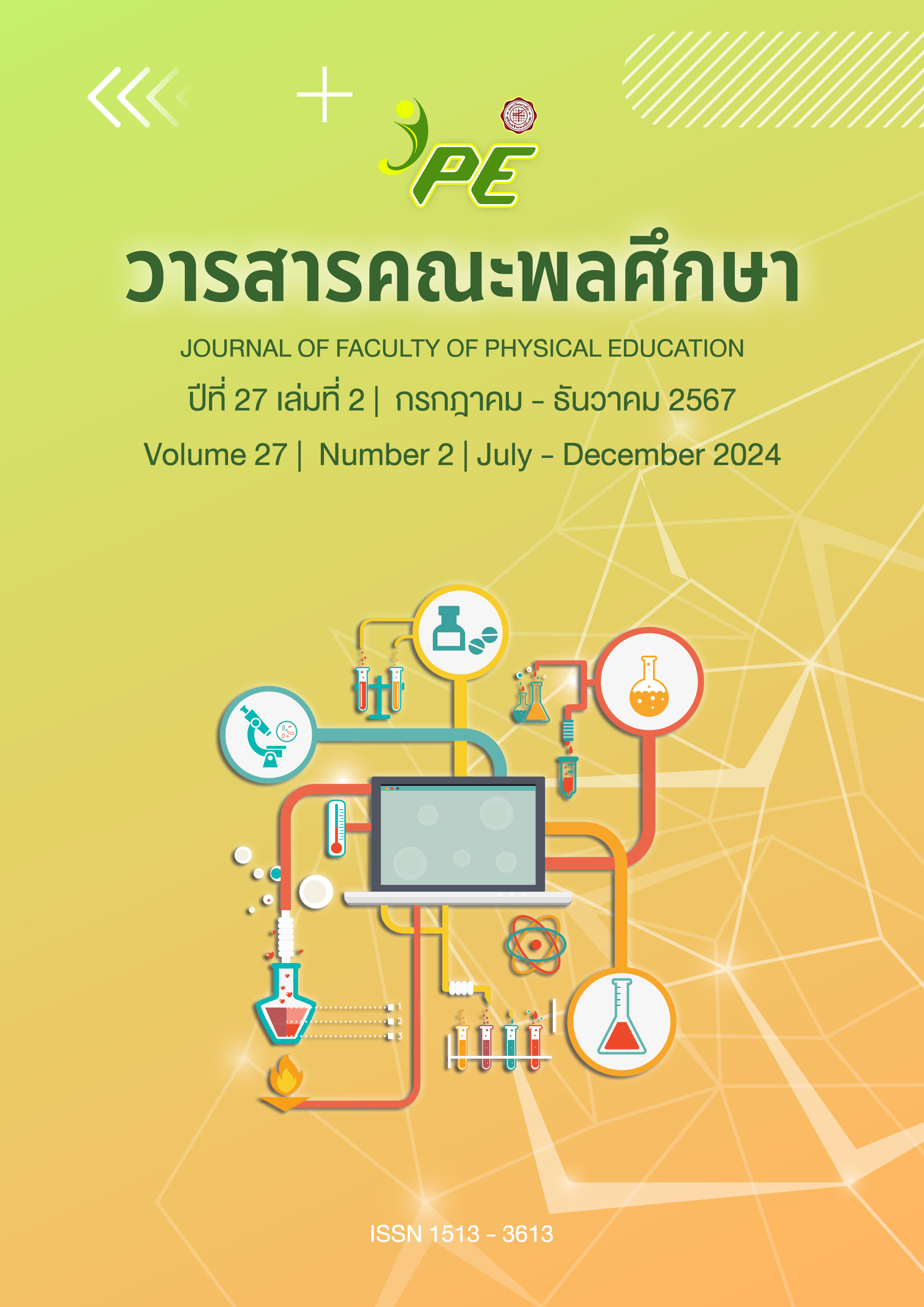THE DEVELOPMENT OF NEW NORMAL EXERCISE PROGRAMS TO IMPROVE HEALTH-RELATED PHYSICAL FITNESS FOR HIGHER EDUCATION STUDENTS
Main Article Content
Abstract
This research aimed to 1) develop a new normal exercise program to enhance health-related physical
fitness for higher education students, and 2) study the effects of the new normal exercise program on health-related
physical fitness for higher education students. The research process was divided into four phases: 1) studying the
problems and needs for the program; 2) developing the program; 3) testing the program; and 4) evaluating and
summarizing the results of the program's use. The sample consisted of 60 higher education students selected
through simple random sampling, with 30 students in the experimental group and 30 students in the control group.
The activities were conducted over a period of 8 weeks, either 5 or 7 days per week. The tools used included 1)
the new normal exercise program and 2) a health-related physical fitness test. Data were analyzed using mean,
standard deviation, and t-tests at a statistical significance level of .05.
The research findings revealed as follows:
1) The developed exercise program had an index of item-objective congruence (IOC) of 0. 94, which
included: 1.1) frequency of exercise 5 or 7 days per week; 1.2) exercise intensity at moderate to heavy levels; 1.3)
duration of exercise not exceeding 60 minutes per day; 1.4) types of exercises divided into three categories: 1.4.1)
cardio with 8 activities; 1.4.2) muscle stretching with 6 poses; and 1.4.3) resistance training using body weight with
7 poses; 1.5) exercise procedures divided into 5 steps: warm-up, dynamic muscle stretching, main exercise, cooldown,
and static muscle stretching.
2) The results of post-experiment indicated that the experimental group exhibited better health-related
physical fitness in terms of cardiovascular and respiratory endurance, muscular endurance, and flexibility compared
to pre-experiment levels with a statistical significance level of .05.
Article Details

This work is licensed under a Creative Commons Attribution-NonCommercial-NoDerivatives 4.0 International License.
Any articles and comments This journal is the opinion of the author. The Faculty of Physical Education doesn't always have to agree. Anyone wishing to publish or distribute a message must obtain direct permission from the author.
References
Bangkok Business. (2020). What does ‘Pandemic’ mean? What happens after the WHO elevates the level of
COVID-19?. Retrieved from https://www.bangkokbiznews.com/news/detail/870455
Bumrungrad International Hospital. (2016). Non-communicable diseases (NCDs)… diseases caused by behavior.
Retrievedfromhttps://www.bumrungrad.com/th/health-blog/may-2016/ncds-non-communicable-diseasessymptoms-
prevention
Charoen, K. (2009). Muscle stretching. Faculty of Education, Kasetsart University.
Charoen, K. (2014). Science of coaching (1st ed.). Sinthana Copy Center Co., Ltd.
Department of Physical Education. Physical fitness tests and norm for people aged 19-59 years. [online] 2021
Available from: https://www.dpe.go.th/manual-preview-411291791796 [2021, April 20]
Haff, G. G., & Triplett, N. T. (2016). Essentials of strength training and conditioning (4th ed.). Human Kinetics.
Manoch, B. (2018). License C training manual
Nirut, S., Sutthana, T., & Ratchanee, K. (2019). Development of exercise program using sensory integration
theory with Thai wisdom to improve health-related physical fitness and social skills of autistic children.
Chulalongkorn University Journal of Education, 47(Supplement 2), 150-168.
Sanook. (2020). Exercise in the new normal: Staying safe from COVID-19. Retrieved from
https://www.sanook.com/health/24645/
Suriyan, S. (2017). A guide for physical activity development for developing physical literacy for prathomsuksa 3
students. (Doctoral dissertation, Kasetsart University).
Thai Health Promotion Foundation. (2020). Thai health watch 2021.
Thailand Knowledge Center for Physical Activity. (2020). Home physical activity guide (1st ed.). Sahamit Printing
and Publishing Co., Ltd.
Thanomwong, K. (2012). Exercise physiology (2nd ed.). Teeranasarn.
topendsports. All Fitness Tests. [online] 2021 Available from:
https://www.topendsports.com/testing/tests.htm [2021, April 20]
VOICEonline. (2020). The Royal Society defines “new normal” as a new way of life, while “new norm” as a new
standard. Retrieved from https://voicetv.co.th/read/gEEgnvbnX
Wisit, K. (2011). Organization and management of physical education. Nam Kang Printing.


